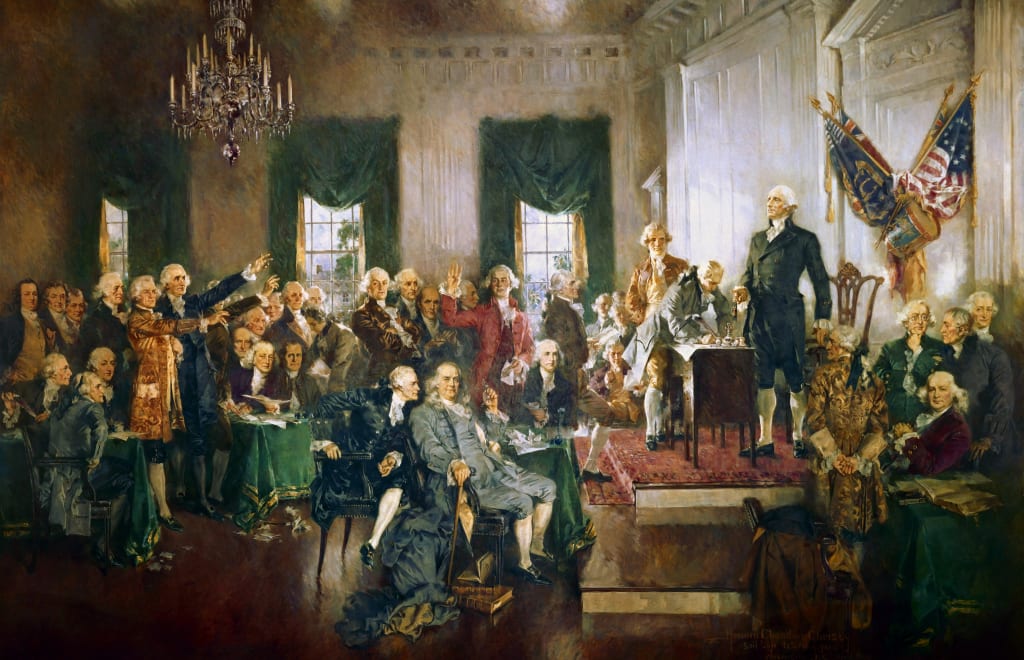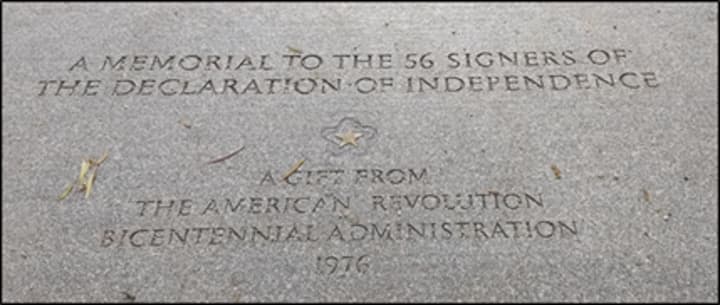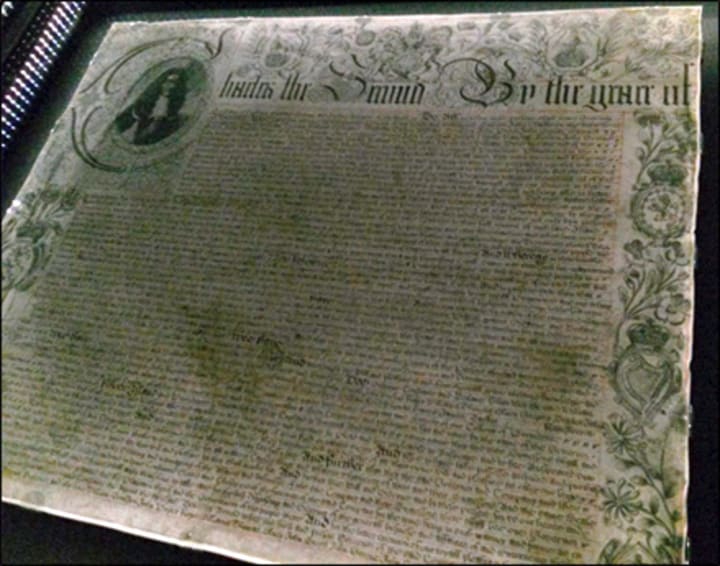
» KEY POINTS
- The process of creating the Constitution was so flawed and rushed that only 39 of the original 74 delegates actually signed off on it.
- Repercussions—both predicted and unexpected—have been rippling down through time because imperfect men made compromises just to get State legislatures to give in.
- In order to correct these issues and reaffirm the values supposed in the Constitution and purported by Americans, we must approve a massive amount of new Amendments.

“The good news is that, if life is long enough, you can learn… that you need to change…”
— Brad Smith
Preamble and Some Regular Ramble
In the years since the Constitution of the United States of America was written, it has been amended a mere 27 times. Are we saying that there are only 27 faults in a document that is over 230 years old? Actually, the 21st Amendment repeals 18th Amendment—the prohibition of the sale of alcohol—so then there would only be 25 corrections! Lest we forget, this a document that thought a fair compromise on slavery was to allow it in certain areas and count people as 3/5th a person in order to gain further power in the House of Representatives.
Granted, some of these amendments have corrected terrible mistakes like having slavery (13th), expanding the right to vote (15th for race, 19th for women), and guaranteeing free expression (1st). However, some have quite questionable value. Are the citizens of the United States truly happy that the 16th Amendment gave Congress the ability to levy an income tax? Was it absolutely necessary for the functions of government to change the date the President, Vice President, and members of Congress started work (20th)?
Even those who wrote the Constitution were not entirely happy with it, which began even before the process started. What commenced with 74 delegates quickly dropped to 55 as a group rebuffed attending for various reasons (aside from Rhode Island which declined to assign delegates at all, but more on them in a moment). To sum up their feelings, elected delegate Patrick Henry refused to attend because he “smelt a rat” in the whole ordeal. This was because the country was run under the Articles of Confederation and there was nothing in the Articles that gave the States or delegates the right to abandon them and form a new government. And even though some tried to do this on the sly, the first group of dropouts realized what was happening and wanted no part in it.
Then, as the process of developing a completely different government moved along, another 13 delegates dropped out leaving just 42. Three of the delegates who stuck around through the entire process did not concur on their collective work leaving just 39 of the delegates — a little over half of the original — to literally sign off on the Constitution. These three refusers could not get past the obvious compromises and bending of moral beliefs, and desperately were looking for protections for the average citizen that would not come until later, if ever.

Once the States got involved in the actual ratification process, the gaps began to be noticed quickly. While Delaware, Pennsylvania, New Jersey, Georgia, and Connecticut were quick to ratify and did so within a couple of months of being presented the final draft; the rest were not so hasty. Despite this, even vehement anti-federalists were eventually turned with the promise of amendments to come, the majority of which became the first ten amendments: The Bill of Rights.
This showed, though, how deficient the document was and what changes already needed to be made. Afterall, the entire Constitution was written in less than four months and at just 4,543 words (including the signatures of the delegates) it is today the shortest Constitution in effect. True, there were few examples at the time to base the United States Constitution on, but this amounts to under ten single-spaced pages in a word processor today! The 27 Amendments have added just another 3,048 words, or an additional six pages. Of course, we probably need to subtract out the amount of words removed by the Amendments as well, but this is not an exercise in detailed algebra!
With those promised changes and implied others, Massachusetts, Maryland, South Carolina, and New Hampshire came on board and the Constitution was officially set to become the law of the land. At this point it was June 1788 and it was agreed that that the government would begin on March 4, 1789. In the time in between, more oaths and treatises were made which brought Virginia and New York into the fold. North Carolina held out more for caution and anti-federalist concerns, but still acted as if in the union anyway. Once the Amendments passed through Congress in September 1789, North Carolina had no more arguments and officially joined the union in November 1789.
Then there was Rhode Island.
On March 24, 1788 the people of Rhode Island were given a chance to vote in a popular election to decide the fate of the Constitution. In a lopsided 92.6% landslide, Rhode Islanders rejected the very idea of this particular document. Why was Rhode Island so vehemently opposed to the end-product of developing a new nation?
As previously noted, Rhode Island was the only State to not even send a delegate to the Constitutional Convention. Despite being the smallest of the former colonies, Rhode Island had a long history of anti-authority sentiment and freedom of expression. Founder Roger Williams and his followers escaped the religious persecution of Massachusetts Puritans to form a place where all could come. While William Penn in Pennsylvania would take this a step much further by actively recruiting religious undesirables, Roger Williams and company laid the groundwork for what would become many of the amendments on personal freedom.
More so, Rhode Island’s Royal Charter of 1663 established by King Charles II of England granted the colony the ability to govern itself and guaranteed religious freedom to all people. This was the first document in the world that granted people the ability to follow the faith of their own choosing without persecution and without a government being able to set an official religion. This separation of Church and State is considered obvious for most modern western democracies today, but it was unique in the 1600's and was still not guaranteed by the late 1700’s.
You see, the Royal Charter on which Rhode Island was governed actually guaranteed more freedoms for Rhode Islanders than the Constitution granted. By signing the Constitution, Rhode Island would, in reality, forfeit rights that their founders had fought and negotiated for. Literally, progress in personal freedom would be sent backwards a hundred years.

Ten of the Twelve proposed Amendments passed by Congress were ratified by enough States to become law on December 15, 1791. One of those other two Amendments did eventually pass — 202 years and 223 days later on May 5, 1992. This Amendment is in fact the last to have been added to the Constitution (27th) and stops Congress from giving itself a pay raise. Congress can now only give a pay raise to the next Congress, of which since 1964 has re-election rates usually above 75% (and generally in the 80%-95% range). In 2018, the House of Representatives had a 91% re-election rate and the Senate 84%. One must remember that a fair amount of incumbents also chose not to run in 2018, thus excluding those former representatives would make these numbers even higher. Essentially, the current Congress is in the next Congress and is giving itself a pay raise, so the 27th Amendment is doing nothing.
The other Amendment not to pass was related to how members of the House of Representatives were distributed among the States and specifically a focus on making sure smaller groups and areas were still represented as the population grew. Whether this particular Amendment would have limited the gerrymandering of today’s electorate is debatable, but it shows that even over 230 years ago these concerns were coming to the forefront.
However, even the ten remaining Amendments still did not completely add up to what Rhode Island was losing. Despite this, Rhode Island ratified the Constitution on May 29, 1791 — well before the Bill of Rights was certified by the States on December 15, 1791. Why did Rhode Island get on board without protections it held out so long for? Eleven times Rhode Islanders voted down the Constitution and its nascent Amendments including the ratio of votes shown before. What changed?
The answer was a threat.
Rhode Island is surrounded by its neighbors with Massachusetts to the north, Connecticut to the west, New York across the bay to the south and the ocean to the east. Even today, no matter where someone is in Rhode Island, they would at most be 18.5 miles from another State or the Atlantic Ocean. Being small and trapped, Rhode Island’s neighbors decreed they would treat Rhode Island like a foreign country and impose taxes on all its exports. Basically, Rhode Island was threatened with financial destruction and the choice was to give in or collapse.
And with that act of economic terrorism, the last of the original thirteen colonies signed up to create the United States of America under the Constitution. The holdouts began the process of becoming a unified nation not because the guiding document was everything they needed or dreamed of, but because it met their needs well enough to be acceptable. It was an imperfect union and came together under imperfect conditions.
This is not to say the Constitution does not have value and is not a strong and well-reasoned governing document overall. Despite the flaws and limited updates, it has provided the backbone to create, support, and stabilize this nation. Where it lapses, laws, policies, and judicial decisions fill in with an attempt to make a more just and free nation.
But that does not mean it should be accepted as-is or believed infallible. The Constitution and the Amendments to it have not created a perfect system, but instead created one with flaws, bureaucracy, bias, imbalance, and—most of all—intransigence.
The Founders were not all-knowing oracles and they did not have a guidebook. As such, they made mistakes that have had many unexpected (and some quite accurately predicted) repercussions rippling down through time. Beyond that, there have been changes in societal norms, technology, and the political layout of the world that they never could have accounted for.
Nor are we more perfect beings than the Founders were. As fellow flawed human beings, we will make mistakes while trying to correct the missteps of the past and create many unintended consequences of our own. Despite that, this is our first step as with any process: acceptance. We must accept that any form of government is only as well developed as its people, and that it must always be a work in progress to reach a more perfect union. And note that the Preamble to the Constitution calls for the creation of a “more perfect Union” and not a “perfect Union”; just the same as the Declaration of Independence calls for the “pursuit of Happiness”, not the guarantee of one. Happiness is always a journey of the individual just as a perfected Union is the journey of a government.
Now if we accept that our Union is imperfect, and that anything we create will still have flaws, what then are our goals for modifying a system that works well enough? What do we actually want to accomplish?
We want to create a system of government that expands upon the ideals and intents of the Founders while also incorporating a modern understanding. This includes having an active, engaged, and represented citizenry that not only feels but is a part of the governmental function. At the same time, we want to prepare for future eventualities that make the government flexible enough to respond but rigid enough to stay by its principles. Beyond all that, we do not want to break what works and what is understood by 230 years of tradition.
In order to do this, there are specific goals that must be kept in mind and adhered to:
- Maintain a three-part government split between the Legislative Branch that creates the law, the Executive Branch that enforces the law, and the Judicial Branch that interprets the laws and hands out punishments for violation of the law. Each branch must be modified to have the appropriate checks and balances over the other branches with the intent of limiting overreach by any other area.
- Checks and balances should be extended to within each branch to limit individuals from controlling the entire government process and fate of the Union. Similarly, the federal government and those who work within it must have the appropriate checks and balances by the State and local governments and the individual people of the United States.
- A representative democracy — a republic — is still the ideal and intended approach, but the representation must be a true mix of the different people and perspectives of the land and not limited by oligopolies and limited choice. Everything must be done to have an actively engaged citizenry who trust that their perspective has a proper voice and that their vote truly matters.
- The intents of the Founders must be modernized to align with current technologies and be made more generic to account for technologies that have yet to be created. However, we must be willing to completely sweep away conventions that are shown to have limited to no value, especially those that add burdens to the people who have implicitly outsourced certain roles to their representatives.
- All changes are to be made to improve discourse and respect the rights of individuals. Wherever possible, specifics of types and monetary levels must not be fixed to exact values and instead be made on equations or definitions that can be derived. This way, the intent of law, spending, and other functions can remain the same while sliding with the changes in definition and needs over time without debate.
- The world will continue to be mutable and so will the needs of the people and governments. Methods for limiting, revisiting, and modifying decisions must be made in order to have flexibility far beyond what is available today. At the same time, flexibility must not be unlimited in order to have stability, and that means vetting processes and other checks that limit the burden on individual people and groups before decisions are enacted.
With these intents in mind, it is now time to lay out the specific policies, laws, and Constitutional Amendments to fundamentally change the conversation in government. And when these are adopted, there will be a NEW AND IMPROVED: UNITED STATES OF AMERICA!

The above piece is a mildly modified excerpt from New & Improved: The United States of America by J.P. Prag, available at booksellers worldwide.

Learn more about author J.P. Prag at www.jpprag.com.

An earlier version of this article appeared on Medium.
About the Creator
J.P. Prag
J.P. Prag is the author of "Compendium of Humanity's End", "254 Days to Impeachment", "Always Divided, Never United", "New & Improved: The United States of America", and "In Defense Of...", and more! Learn more at www.jpprag.com.






Comments (1)
I find your article very interesting and informative, and most likely will come back to it and other articles of yours to consider them further. The only point I find myself disagreeing with at the moment is your assertion that the Rhode Island's Royal Charter of 1663 was "the first document in the world that granted people the ability to follow the faith of their own choosing without persecution". I believe both of those rights were also present in the Edict of Milan granted by Roman Emperor Constantine in 313. But maybe I'm missing your point, and if so I'd be interested in more info on the subject.